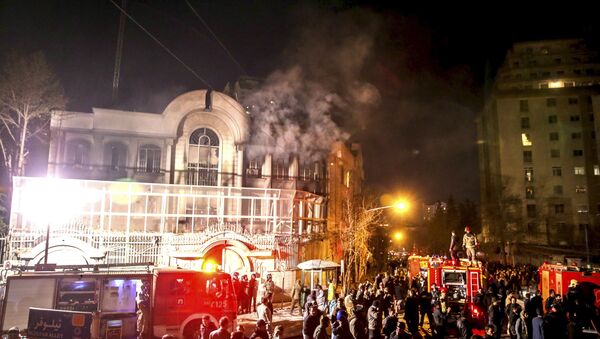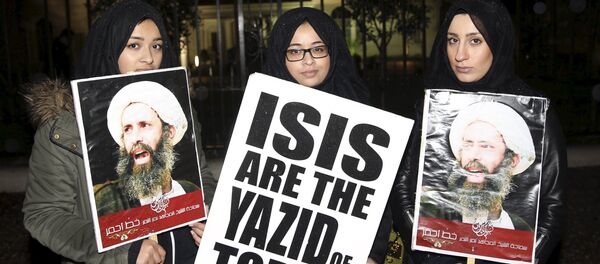On Sunday, Iranian Supreme Leader Ayatollah Ali Khamenei warned that "divine vengeance will befall Saudi politicians" for "the unjustly spilled blood" of prominent Shia cleric Nimr al-Nimr, executed by the Saudis on Saturday.
The cleric was killed along with 46 others in the country's largest mass execution in decades, sparking anger and violent protests in Shia areas of Saudi Arabia, as well as Bahrain, Indian-controlled Kashmir, Pakistan, and Iran, where protesters stormed the Saudi Embassy in the Iranian capital and attempted to set the building on fire.
Trying to prevent the explosive situation from escalating out of control, Iranian President Hassan Rouhani vowed to bring to justice those responsible for Saturday's attack. "The Iranian people should not allow [al-Nimr's death] to become an excuse for rogue individuals and groups to commit illegal acts and damage Iran's image," Rouhani said.
Speaking to his EU counterpart on Sunday, Iranian Foreign Minister Javad Zarif said that Iranian authorities had taken steps "to defuse the tensions and protect the Saudi diplomats."
Nevertheless, Saturday's execution has only resulted in the further deterioration of relations which were already less than cordial. In several of the region's ongoing conflicts, Tehran and Riyadh are on opposite sides of the barricades.
Furthermore, in Yemen, Saudi Arabia has formed a military coalition to try to crush the Shia tribesmen known as the Houthis, who overthrew the government of Saudi-backed president Abd Rabbuh Mansur Hadi last year. Accusing the coreligionists of being a proxy for Iran (claims which both the Houthis and Tehran have denied), Riyadh launched a military campaign, including a naval blockade, prompting criticism that the intervention has caused a 'humanitarian catastrophe'.
At the same time that it has struggled with real and imaginary Iranian threats abroad, the Saudi dynasty has also grown fearful of Shiites living in Saudi Arabia itself.
Commenting on the escalating conflict for Russia's Gazeta.ru, Vladimir Ahmedov, a senior researcher at the Institute of Asian Studies of the Russian Academy of Sciences, called the emerging situation "somewhat frightening." According to the academic, the conflict in the Middle East threatens to gain a new, religious dimension, openly becoming a war between Sunnis and Shiites.
"Living in the 21st century, we have been thrown back into the Middle Ages, when the main factor of wars was religion," rather than geopolitical considerations and the capture of territory. "This," Ahmedov warned, "reduces the possibility of coming to an agreement in the most acute conflicts in the region."
As far as Russia is concerned, the analyst warned that the cleric's killing portends positive negative consequences, with the regional sectarian conflict threatening to to Russia's borders, "to the neighboring states of Russia's underbelly in Central Asia." Ultimately, the analyst suggests, "I have no optimistic forecasts on this situation being resolved in the near future. Still, we can only place our hopes in the true authorities of the Muslim world."





